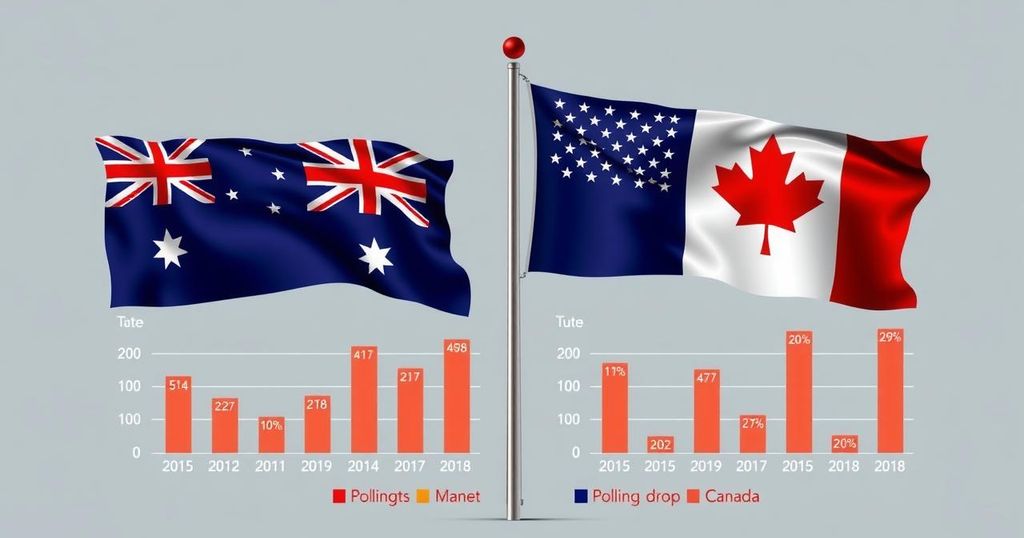Politics
AMERICA, ASIA, AUSTRALIA, BEN WELLINGS, CANADA, CANADIAN LIBERAL PARTY, CLAYTON, CLAYTON CHIN, COALITION, CUBA, DONALD TRUMP, DUTTON, ELECTION, GOVERNMENT, IMMIGRATION POLICY, JAPAN, JUSTIN TRUDEAU, LABOR, LIBERAL PARTY, MARK CARNEY, MELBOURNE, MONASH UNIVERSITY, NORTH AMERICA, OCEANIA, PETER DUTTON, PIERRE POILIEVRE, POILIEVRE, POLITICS, POPULISM, TRUDEAU, TRUMP, UNIVERSITY, US, USA
Marcus Li
0 Comments
The Impact of Donald Trump’s Influence on Australian and Canadian Elections
Canadian and Australian elections are approaching, with conservative parties unexpectedly falling behind center-left incumbents. Influenced by Donald Trump’s actions and trade policies, this shift in polling reflects widespread anti-Trump sentiment. Voters are calling for strong leadership that prioritizes national interests, demonstrating the significant impact of external factors on domestic politics.
In the upcoming weeks, voters in Canada and Australia will participate in significant elections. Initially, opposition conservative parties were expected to secure victories; however, their support has drastically declined, resulting in them trailing behind the center-left incumbents. Ben Wellings, a senior lecturer at Monash University, noted, “Both Poilievre and Dutton are dropping in the polls. I do think that this is something to do with the problem that Donald Trump is posing for these centre-right candidates.”
The polls clearly reflect a marked drop in support for both conservative parties in Canada and Australia. In Australia, the Coalition had experienced a rise in popularity as of late last year, but this trend sharply reversed in February, coinciding with Trump’s inauguration and the commencement of his trade war against allies. In Canada, the Conservatives experienced a similar decline, going from a commanding 20-point lead to a six-point deficit behind the ruling Liberal Party.
Until January, Canadian Conservatives, led by Pierre Poilievre, were predicted to win against the Liberals, who had suffered nine years of unpopularity. However, Prime Minister Justin Trudeau’s strong reaction to Trump’s trade war resonated with Canadians, revitalizing support for the Liberals. Clayton Chin, a political theorist, remarked, “When you start questioning sovereignty, that completely changed the tone of the election.”
In Australia, Opposition Leader Peter Dutton faced backlash for a favorable characterization of Trump. His selections, including Senator Jacinta Price, have drawn comparisons to Trump’s appointees. Senator Price’s use of “Make Australia Great Again” further aligned the Australian conservatives with Trump’s brand of politics. Dr. Chin observed, “Some of those figures are very sympathetic to Trump’s politics and have actual and continuing ties to the Trump administration.”
Although there are compelling parallels in conservative campaigns between the two countries, Antony Green cautioned that Trump’s impact should not be overstated. He suggested that while the Coalition benefited from populist appeals, they have since moderated these positions. He highlighted that unlike in Canada, where the threat to independence feels more immediate due to trade tariffs, Australia’s conservative response has wavered.
Public sentiment in Australia indicates rising anti-Trump attitudes. Recent polling revealed that many voters would be less inclined to support Dutton due to Trump’s influence, with a substantial portion of Australians expressing low trust in the U.S. to act responsibly. Respondents voiced concerns regarding Australia’s relationship with the Trump administration and called for more vocal opposition to Trump.
The prevailing anti-Trump sentiment stems from a sense of betrayal felt due to the historical ties both countries have with the U.S. Dr. Chin emphasized this sentiment, stating, “There’s a real strong sense of the betrayal of friends.” The implications of this sentiment are palpable as voters express the desire for leaders who will prioritize national interests while standing against Trump’s policies.
Despite the prevailing dynamics, election outcomes can be unpredictable. Post-election analysis in Canada is already underway, with Conservative strategist Kory Teneycke critiquing his party’s performance in losing a substantial lead. He aptly stated, “Blowing a 25-point lead and being like 10 points down is campaign malpractice at the highest level.”
Antony Green pointed out that such significant shifts in polling typically require substantial external disruptions, identifying Trump as a crucial factor behind the dramatic turnaround in Canadian politics.
The elections in Australia and Canada witness a notable decline in support for conservative parties, attributing significant influence to Donald Trump’s polarizing presence. While both countries navigate their electoral landscapes, anti-Trump sentiments resonate among voters, impacting leadership perceptions. It remains crucial to analyze how these dynamics will shape upcoming election results and the future direction of political parties in both nations.
Original Source: www.abc.net.au




Post Comment